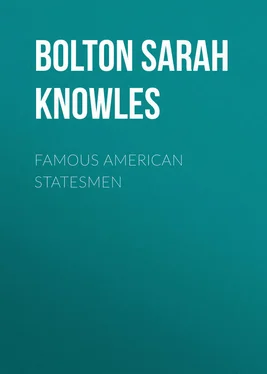Sarah Bolton - Famous American Statesmen
Здесь есть возможность читать онлайн «Sarah Bolton - Famous American Statesmen» — ознакомительный отрывок электронной книги совершенно бесплатно, а после прочтения отрывка купить полную версию. В некоторых случаях можно слушать аудио, скачать через торрент в формате fb2 и присутствует краткое содержание. ISBN: , Жанр: foreign_prose, foreign_antique, foreign_language, на английском языке. Описание произведения, (предисловие) а так же отзывы посетителей доступны на портале библиотеки ЛибКат.
- Название:Famous American Statesmen
- Автор:
- Жанр:
- Год:неизвестен
- ISBN:http://www.gutenberg.org/ebooks/39012
- Рейтинг книги:5 / 5. Голосов: 1
-
Избранное:Добавить в избранное
- Отзывы:
-
Ваша оценка:
- 100
- 1
- 2
- 3
- 4
- 5
Famous American Statesmen: краткое содержание, описание и аннотация
Предлагаем к чтению аннотацию, описание, краткое содержание или предисловие (зависит от того, что написал сам автор книги «Famous American Statesmen»). Если вы не нашли необходимую информацию о книге — напишите в комментариях, мы постараемся отыскать её.
Famous American Statesmen — читать онлайн ознакомительный отрывок
Ниже представлен текст книги, разбитый по страницам. Система сохранения места последней прочитанной страницы, позволяет с удобством читать онлайн бесплатно книгу «Famous American Statesmen», без необходимости каждый раз заново искать на чём Вы остановились. Поставьте закладку, и сможете в любой момент перейти на страницу, на которой закончили чтение.
Интервал:
Закладка:
He worked earnestly for common schools and the establishment of a university in his native State, believing that it is the right and duty of a nation to make its people intelligent and capable of self-government.
In June, 1779, Jefferson was made governor of Virginia, to succeed Patrick Henry, her first governor. The Revolutionary War had been going forward, with some victories and some defeats. Virginia had given generously of men, money, and provisions. The war was being transferred to the South, as its battle-ground. British fleets had laid waste the Atlantic coast. Benedict Arnold and Cornwallis had ravaged Virginia. When General Tarlton was ordered to Charlottesville, in 1781, and it seemed probable that Monticello would fall into his hands, Jefferson moved his family to a place of safety.
When the British arrived, and found that the governor was not to be captured, they retired without committing the slightest injury to the place. This was in return for kindness shown by Jefferson to four thousand English prisoners, who had been sent from near New York, to be in camp at Charlottesville, where it seemed cheaper to provide for them. Jefferson rightly said: "It is for the benefit of mankind to mitigate the horrors of war as much as possible. The practice, therefore, of modern nations, of treating captive enemies with politeness and generosity, is not only delightful in contemplation, but really interesting to all the world – friends, foes, and neutrals."
Two faithful servants at Monticello, fearful that the silver might be stolen by the red-coats, concealed it under a floor a few feet from the ground; Cæsar, removing a plank, and slipping through the cavity, received it from the hands of Martin. The soldiers came just as the last piece was handed to Cæsar; the plank was immediately restored to its place, and for nearly three days and nights the poor colored man remained in the dark, without food, guarding his master's treasures. When a soldier put his gun to the breast of Martin and threatened to fire unless Jefferson's whereabouts was disclosed, the brave fellow answered, "Fire away, then!" A man or woman who wins and holds such loyalty from dependents is no ordinary character.
After holding the office of governor for two years, Jefferson resigned, feeling that a military man would give greater satisfaction. Such a one followed him, but with no better success among the half-despairing patriots, destitute of money and supplies. Jefferson, with his sensitive spirit, felt keenly the criticisms of some of the people, saying, "They have inflicted a wound on my spirit which will only be cured by the all-healing grave." He refused to return to public life, and looked forward to happy years of quiet study at Monticello.
How little we know the way which lies before us. We long for sunlight, and perchance have only storms. We love to be as children who must be carried over the swamps and rough places, not knowing that strength of manhood and womanhood comes generally through struggling. The "happy years" at Monticello were already numbered. Another little girl had come to gladden the heart of the man who so loved children, and had quickly taken her departure. And now Martha Jefferson, at thirty-four, the sweet, gentle woman who had lived with him only ten short years, was also going away. She talked with him calmly about the journey; she said she could not die content if she thought their children would have a stepmother. The young governor, without a moment's thought as to his future happiness, taking her hand, solemnly promised that he would never marry again, and he kept his word. It is not known that any person ever entered the place left vacant in his heart by Martha Jefferson's death.
For four months he had watched by her bedside, or had his books so near her that he could work without being separated from her. When she died he fainted, and remained so long insensible that the attendants thought he could never be restored to consciousness. For three weeks he kept his room, ministered to by his little daughter Martha, who wound her arms about his neck, with that inexpressible consolation that only a pure, sweet child-nature can give. She said years later, "I was never a moment from his side. He walked almost incessantly, night and day, only lying down occasionally, when nature was completely exhausted… When, at last, he left his room, he rode out, and from that time he was on horseback rambling about the mountain, in the least frequented roads, and just as often through the woods. In those melancholy rambles I was his constant companion, a solitary witness to many a burst of grief."
He longed now for a change of scene; Monticello was no more a place of peace and rest. Being elected to Congress, he took his seat in November, 1783. To him we owe, after much heated discussion, the adoption of the present system of dollars and cents, instead of pounds and shillings. In May, 1784, he was appointed minister to France, to join Dr. Franklin and John Adams in negotiating commercial treaties. He sailed in July, taking with him his eldest child, Martha, leaving Mary and an infant daughter with an aunt.
The educated governor and congressman of course found a cordial welcome in Parisian society, for was he not the author of the Declaration of Independence, endeared to all lovers of liberty, in whatever country. He was charmed with French courtesy, thrift, and neatness, but he was always an American in sentiment and affection. He wrote to his young friend, James Monroe, afterwards President: "The pleasure of the trip to Europe will be less than you expect, but the utility greater. It will make you adore your own country, – its soil, its climate, its equality, liberty, laws, people, and manners. How little do my countrymen know what precious blessings they are in possession of, and which no other people on earth enjoy!" More and more he loved, and believed in, a republic. He wrote to a friend: "If all the evils which can arise among us from the republican form of government, from this day to the day of judgment, could be put into scale against what this country suffers from its monarchical form in a week, or England in a month, the latter would preponderate. No race of kings has ever presented above one man of common-sense in twenty generations. The best they can do is to leave things to their ministers; and what are their ministers but a committee badly chosen?"
Jefferson spent much time in looking up the manufacturing and agricultural interests of the country, and kept four colleges – Harvard, Yale, William and Mary, and the College of Philadelphia – advised of new inventions, new books, and new phases of the approaching Revolution.
He had placed his daughter Martha in a leading school. His letters to her in the midst of his busy life show the beautiful spirit of the man, who was too great ever to rise above his affectional nature. "The more you learn the more I love you," he wrote her; "and I rest the happiness of my life on seeing you beloved by all the world, which you will be sure to be if to a good heart you join those accomplishments so peculiarly pleasing in your sex. Adieu, my dear child; lose no moment in improving your head, nor any opportunity of exercising your heart in benevolence."
His baby-girl, Lucy, died two years after her mother, and now only little Mary was left in America. He could not rest until this child was with him in France. She came, with a breaking heart on leaving the old Virginia home and her aunt. On board the vessel she became so attached to the captain that it was almost impossible to take her from him. She spent some weeks with Mrs. John Adams in London, who wrote: "A finer child I never saw. I grew so fond of her, and she was so much attached to me, that, when Mr. Jefferson sent for her, they were obliged to force the little creature away."
Once in Paris, the affectionate child was placed at school with her sister Martha, to whom Jefferson wrote: "She will become a precious charge upon your hands… Teach her, above all things, to be good, because without that we can neither be valued by others nor set any value on ourselves. Teach her to be always true; no vice is so mean as the want of truth, and at the same time so useless. Teach her never to be angry; anger only serves to torment ourselves, to divert others, and alienate their esteem."
Читать дальшеИнтервал:
Закладка:
Похожие книги на «Famous American Statesmen»
Представляем Вашему вниманию похожие книги на «Famous American Statesmen» списком для выбора. Мы отобрали схожую по названию и смыслу литературу в надежде предоставить читателям больше вариантов отыскать новые, интересные, ещё непрочитанные произведения.
Обсуждение, отзывы о книге «Famous American Statesmen» и просто собственные мнения читателей. Оставьте ваши комментарии, напишите, что Вы думаете о произведении, его смысле или главных героях. Укажите что конкретно понравилось, а что нет, и почему Вы так считаете.












